| Listing 1 - 9 of 9 |
Sort by
|
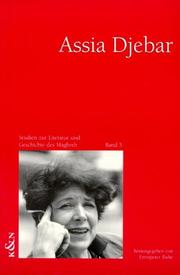
ISBN: 3826021452 9783826021459 Year: 2001 Publisher: Würzburg Königshausen und Neumann
Abstract | Keywords | Export | Availability | Bookmark
 Loading...
Loading...Choose an application
- Reference Manager
- EndNote
- RefWorks (Direct export to RefWorks)
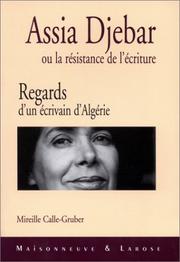
ISBN: 2706815302 9782706815300 Year: 2001 Publisher: Paris Maisonneuve et Larose
Abstract | Keywords | Export | Availability | Bookmark
 Loading...
Loading...Choose an application
- Reference Manager
- EndNote
- RefWorks (Direct export to RefWorks)
Djebar, Assia --- Djebar, Assia, --- Criticism and interpretation. --- 804.0 --- 840 "19" DJEBAR, ASSIA --- Frans. Franse taalkunde --- Franse literatuur--20e eeuw. Periode 1900-1999--DJEBAR, ASSIA --- -Criticism and interpretation --- 840 "19" DJEBAR, ASSIA Franse literatuur--20e eeuw. Periode 1900-1999--DJEBAR, ASSIA --- 804.0 Frans. Franse taalkunde --- -Djebar, A. --- Criticism and interpretation --- anno 1900-1999 --- Algeria --- Djebbar, Assia, --- Jabbār, Āsiyā, --- Imalhayene, Fatma-Zohra, --- Djebar, Assia, - 1936- - Criticism and interpretation. --- Djebar, Assia, - 1936 --- -Djebar, Assia, --- Literature --- Writers --- Book
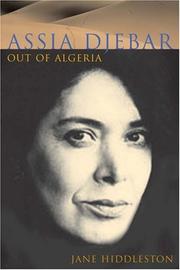
ISBN: 1786945347 1846312604 9781846312601 1846316855 9781846316852 1846310318 9781846310317 9781846310237 9781786945341 1429827017 1846310237 9781846310232 Year: 2006 Publisher: Liverpool Liverpool University Press
Abstract | Keywords | Export | Availability | Bookmark
 Loading...
Loading...Choose an application
- Reference Manager
- EndNote
- RefWorks (Direct export to RefWorks)
For more than fifty years, Assia Djebar, Silver Chair of French at New York University and winner of the Neustadt Prize for Contribution to World Literature, has used the tools of poetry, fiction, drama and film to vividly portray the world of Muslim women in all its complexity. In the process, she has become one of the most important figures in North African literature. In Assia Djebar, Jane Hiddleston traces Djebars development as a writer against the backdrop of North Africas tumultuous history. Whereas Djebars early writings were largely an attempt to delineate clearly the experience of being a woman, an intellectual, and an Algerian embedded in that often violent history, she has in her more recent work evinced a growing sense that the influence of French culture on Algerian letters may make such a project impossible. The first book-length study of this significant writer, Assia Djebar will be of tremendous interest to anyone studying post-colonial literature, womens studies or Francophone culture.
Languages & Literatures --- Romance Literatures --- French Literature --- Middle Eastern Languages & Literatures --- Djebar, Assia, --- Jabbār, Āsiyā --- Djebar, Assia --- Djebar, A. --- Imalhayene, Fatma-Zohra --- Criticism and interpretation. --- Algeria --- In literature. --- Algerians in literature. --- Algerian literature (French) --- Women authors --- History and criticism.
Book
ISBN: 0231539878 9780231539876 9780231172561 0231172567 Year: 2015 Publisher: New York, NY
Abstract | Keywords | Export | Availability | Bookmark
 Loading...
Loading...Choose an application
- Reference Manager
- EndNote
- RefWorks (Direct export to RefWorks)
Born and raised in French Algeria, Assia Djebar and Hélène Cixous represent in their literary works signs of conflict and enmity, drawing on discordant histories so as to reappraise the political on the very basis of dissensus.In a rare comparison of these authors' writings, Algerian Imprints shows how Cixous and Djebar consistently reclaim for ethical and political purposes the demarcations and dislocations emphasized in their fictions. Their works affirm the chance for thinking afforded by marginalization and exclusion and delineate political ways of preserving a space for difference informed by expropriation and nonbelonging. Cixous's inquiry is steeped in her formative encounter with the grudging integration of the Jews in French Algeria, while Djebar's narratives concern the colonial separation of "French" and "Arab," self and other. Yet both authors elaborate strategies to address inequality and injustice without resorting to tropes of victimization, challenging and transforming the understanding of the history and legacy of colonized space.
Women and literature --- Politics and literature --- Literature --- Literature and politics --- Political aspects --- Djebar, Assia, --- Cixous, Hélène, --- Jabbār, Āsiyā --- Djebar, Assia --- Djebar, A. --- Imalhayene, Fatma-Zohra --- Criticism and interpretation. --- Cixous, Hélène
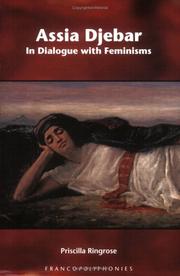
ISBN: 9401201803 1423790960 9781423790969 9789401201803 9042017392 9789042017399 Year: 2006 Publisher: Amsterdam Rodopi
Abstract | Keywords | Export | Availability | Bookmark
 Loading...
Loading...Choose an application
- Reference Manager
- EndNote
- RefWorks (Direct export to RefWorks)
What are the political implications of an Arab feminist writing practice? How do the works of Assia Djebar, Algeria's internationally acclaimed francophone writer, relate to the priorities and perspectives of both Western and Arab feminist politics? Does Djebar succeed in her aim of reclaiming the history of her homeland, and of her religion, Islam, for women? Or in reclaiming the sexuality of Arab women? In Assia Djebar: In Dialogue with Feminisms , Priscilla Ringrose uncovers the mechanisms of Djebar's revisionary feminism and examines the echoes and dissonances between what Djebar terms her "own kind of feminism" and the thinking of French and Arab feminists such as Irigaray, Cixous, Kristeva, Mernissi and Ahmed. Arguing that Djebar's work is in constant dialogue with other feminisms, Ringrose assesses the strengths and weaknesses of its ideals and identifies their own particular intervention into current political and cultural debates. This book will appeal not only to scholars working on Djebar, but also to students of colonial history, women's studies and cultural politics.
Feminism and literature. --- Feminism in literature. --- Muslim women in literature. --- Women in literature. --- Woman (Christian theology) in literature --- Women in drama --- Women in poetry --- Feminist theory in literature --- Literature --- Women authors --- Djebar, Assia, --- Jabbār, Āsiyā --- Djebar, Assia --- Djebar, A. --- Imalhayene, Fatma-Zohra --- Criticism and interpretation. --- Djebbar, Assia, --- Jabbār, Āsiyā, --- Imalhayene, Fatma-Zohra, --- Literature and feminism
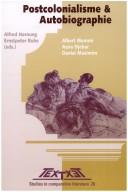
ISBN: 9042006951 9789042006959 Year: 1998 Publisher: Amsterdam Rodopi
Abstract | Keywords | Export | Availability | Bookmark
 Loading...
Loading...Choose an application
- Reference Manager
- EndNote
- RefWorks (Direct export to RefWorks)
Non-fiction --- Comparative literature --- Memmi, Albert --- Djebar, Assia --- Maximin, Daniel --- 804.0 --- 840 --- 804.0 Frans. Franse taalkunde --- Frans. Franse taalkunde --- Franse literatuur --- Autobiografieën. --- Autobiographie --- Autobiographie. --- Autobiography --- Autobiography. --- Littérature antillaise (française) --- Littérature maghrébine (française) --- North African literature (French) --- North African literature (French). --- Postcolonialism --- Postcolonialism. --- Postcolonialisme --- West Indian literature (French) --- West Indian literature (French). --- autobiography (genre). --- Histoire et critique --- History and criticism --- History and criticism. --- Djebar, Assia, --- Maximin, Daniel, --- Memmi, Albert, --- Memmi, Albert. --- Criticism and interpretation --- Critique et interprétation --- Criticism and interpretation. --- 1900-1999. --- Lesser Antilles --- North Africa.
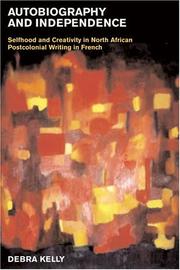
ISBN: 1781386161 1846312620 9781846312625 0853236593 9780853236597 9781781386163 Year: 2005 Publisher: Liverpool Liverpool University Press
Abstract | Keywords | Export | Availability | Bookmark
 Loading...
Loading...Choose an application
- Reference Manager
- EndNote
- RefWorks (Direct export to RefWorks)
This book offers an in-depth study of the autobiographical writings of four twentieth-century writers from North Africa, Assia Djebar, Mouloud Feraoun, Abdelkébir Khatibi and Albert Memmi, as they explore issues of language, identity and the individual's relationship to history. The book places these writers in a clearly defined theoretical context, introducing and contextualising each of the four through the application of postcolonial studies and literary theory on autobiography linked to close textual reading of their works. Avoiding both psychoanalytical theory and approaches concerned primarily with the writer's 'testimony value', Kelly concentrates instead on the poetic and literary qualities of each author's work, dwelling on the politics and poetics of identity, as well as the ethics and aesthetics of this literature. She includes clear discussions of key terms such as 'postcolonial', 'Francophone', and 'autobiography', which current academic discourse has rendered very complex and even opaque. The book includes a fascinating photograph of two stone tablets inscribed with Punic and Numidian scripts, now held in the British Museum, which Assia Djebar writes about at length in one of the texts studied in the book.
North African literature (French) --- Identity (Psychology) in literature. --- History and criticism. --- Feraoun, Mouloud --- Djebar, Assia, --- Memmi, Albert --- Khatibi, Abdelkebir, --- ʻAbd al-Kabīr al-Khaṭībī, --- ʻAbd al-Kabīr Khaṭībī, --- Abdelkebir Khatibi, --- Khaṭībī, ʻAbd al-Kabīr, --- Khatibi, Abdelkabir, --- خطيبي، عبد الكبير --- خطيبي، عبد الكبير، --- عبد الكبير الخطيبي --- ממי, אלבר --- Memi, Alber --- Djebbar, Assia, --- Jabbār, Āsiyā, --- Imalhayene, Fatma-Zohra, --- Firʻawn, Mawlūd --- فرعون، مولود --- مولود فرعون --- Criticism and interpretation. --- Khatibi, Abdelkbir, --- Jabbār, Āsiyā --- Djebar, Assia --- Djebar, A. --- Imalhayene, Fatma-Zohra
Book
ISBN: 9789042035928 9042035927 9781283868839 1283868830 9789401208673 9401208670 Year: 2012 Volume: 30 Publisher: Amsterdam Rodopi
Abstract | Keywords | Export | Availability | Bookmark
 Loading...
Loading...Choose an application
- Reference Manager
- EndNote
- RefWorks (Direct export to RefWorks)
Face à un réel qui avait atteint une violence innommable et par défaut de consensus historique, les romancières algériennes, fatalement ébranlées par la recrudescence de la violence en Algérie avec la montée de l’intégrisme islamiste des années 1990, se sont armées de leur plume pour combattre cet obscurantisme impétueux. Tout en reconnaissant la difficulté de dire l’horreur, l’écriture romanesque fonctionne comme un détour, le seul souvent possible pour appréhender l’inimaginable et représenter l’irreprésentable et, surtout, en rendre compte pour ceux qui ne savent pas ou refusent tout simplement de le croire. Témoignages fictionnels au féminin analyse les rapports existant entre le factuel et le fictionnel, entre témoigner et raconter, dans une conjoncture où de telles frontières semblent floues. À travers l’étude des « témoignages fictionnels » d’Assia Djebar, Malika Mokeddem, Leïla Marouane et Latifa Ben Mansour, ce livre tente de répondre à cette question si épineuse: jusqu’à quel degré la littérature est-elle capable de transcender sa propre littérarité à travers un mode d’expression figurative qui représente le réel même? En d’autres termes, comment la volonté de dire la vérité peut-elle s’allier à l’envie de faire de la fiction, sans que la question éthique compromette l’intention esthétique? Bref, comment écrire une fiction du réel?
Algerian literature (French) --- Women and literature --- Literature --- French literature --- Women authors --- History and criticism. --- Algerian authors --- Djebar, Assia, --- Mokeddem, Malika --- Marouane, Leïla --- Ben Mansour, Latifa, --- Mansour, Latifa Ben, --- Mechentel, Leyla Z. --- Muqaddim, Malīkah --- Mokaddem, Malika --- مقدّم، مليكة --- Jabbār, Āsiyā --- Djebar, Assia --- Djebar, A. --- Imalhayene, Fatma-Zohra --- Criticism and interpretation. --- Algeria --- History --- Literature and the revolution. --- al-Dzāyīr --- al-Jazāʼir --- Algérie --- Algerien --- Algeriet --- Alg'eryah --- Algieria --- Algierska Republika Ludowo-Demokratyczna --- Alg'iryah --- Alzhir --- Alžir --- Argelia --- Cezayir --- Democratic and Popular Republic of Algeria --- Democratic Republic of Algeria --- Dżumhurija al-Dżazajrija asz-Szaabija ad-Dimukratija --- Gouvernement général de l'Algérie --- Jumhūrīyah al-Jazāʼirīyah al-Dīmuqrāṭīyah wa-al-Shaʻbīyah --- Jumhūrīyah al Jazāʼirīyah ash Shaʻbīyah --- People's Democratic Republic of Algeria --- République algérienne démocratique et populaire --- אלג'יריה --- الجزائر --- الدزاير --- Алжир --- Algeria (Provisional Government, 1958-1962) --- Algerian fiction (French)
Book
ISBN: 0804773408 9780804773409 0804762368 9780804762366 9780804762366 0804762376 9780804762373 Year: 2010 Publisher: Stanford : Stanford University Press,
Abstract | Keywords | Export | Availability | Bookmark
 Loading...
Loading...Choose an application
- Reference Manager
- EndNote
- RefWorks (Direct export to RefWorks)
The resurgence of 'world literature' as a category of study seems to coincide with what we understand as globalization, but how does postcolonial writing fit into this picture? Beyond the content of this novel or that, what elements of postcolonial fiction might challenge the assumption that its main aim is to circulate native information globally? "The Long Space" provides a fresh look at the importance of postcolonial writing by examining how it articulates history and place both in content and form. Not only does it offer a new theoretical model for understanding decolonization's impact on duration in writing, but through a series of case studies of Guyanese, Somali, Indonesian, and Algerian writers, it urges a more protracted engagement with time and space in postcolonial narrative. Although each writer - Wilson Harris, Nuruddin Farah, Pramoedya Ananta Toer, and Assia Djebar - explores a unique understanding of postcoloniality, each also makes a more general assertion about the difference of time and space in decolonization. Taken together, they herald a transnationalism beyond the contaminated coordinates of globalization as currently construed.
Postcolonialism in literature. --- Transnationalism in literature. --- Space and time in literature. --- Literature, Modern --- Space and time as a theme in literature --- History and criticism. --- Harris, Wilson --- Farah, Nuruddin, --- Toer, Pramoedya Ananta, --- Djebar, Assia, --- Djebbar, Assia, --- Jabbār, Āsiyā, --- Imalhayene, Fatma-Zohra, --- Tur, Pramudya Ananta, --- Pramoedya Ananta Toer, --- Pramudya Ananta Tur, --- Po-a-nan-ta Tu-erh, --- Tu-erh, Po-a-nan-ta, --- Tur, Pramudya A. --- Pram, --- Nuruddin Farah, --- Harris, Theodore Wilson --- Waruk, Kona --- Criticism and interpretation. --- Postcolonialism in literature --- Space and time in literature --- Transnationalism in literature --- History and criticism --- Espace et temps --- Transnationalisme --- Littérature postcoloniale --- Dans la littérature --- Thèmes, motifs --- Espace et temps -- Dans la littérature --- Transnationalisme -- Dans la littérature --- Littérature postcoloniale -- Thèmes, motifs
| Listing 1 - 9 of 9 |
Sort by
|

 Search
Search Feedback
Feedback About UniCat
About UniCat  Help
Help News
News